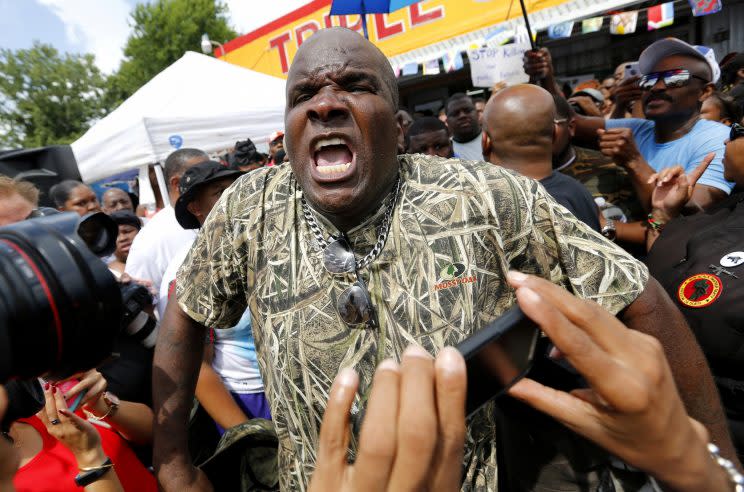Arthur Reed, the man behind the Alton Sterling shooting video, is on a quest to fight violence with film

Arthur Reed pulled up to his house in Baton Rouge, La., one recent afternoon to find two FBI agents waiting at his door.
Reed is no stranger to law enforcement, having bounced in and out of prison during the 22 years he spent as a gang leader in Louisiana and California. But this time, the reformed criminal wasn’t in trouble. The agents were on his doorstep because they needed his help.
Days earlier, Reed’s antiviolence organization Stop the Killing Inc., had released a cellphone video that showed Baton Rouge police officers fatally shooting a 37-year-old black man named Alton Sterling in a convenience store parking lot. The video, which quickly went viral, propelled Sterling’s death into a national news story and ignited protests against police violence across the country. Within days, the U.S. Justice Department had opened a federal civil rights investigation into the shooting.
Now, Reed told Yahoo News, the FBI wanted to know who shot the cellphone footage — and if there was more where that came from.
Did he give up his source? “No, of course not,” Reed replied. “We gave them what we had, that’s all we can do.”
Since 2005, thanks to the help of a wide network of amateur documentarians — many of whom, he says, listen to his weekly radio show on the local hip-hop and R & B station Max 94.1 FM — Reed has logged countless hours’ worth of violent footage from around Baton Rouge and beyond. He continuously compiles the videos into a multipart documentary called “To Live and Die in Amerikkka,” which can be viewed on YouTube. The Sterling video was the first to go viral.
In recent years, the combination of camera-equipped smartphones and virtually instantaneous social media technology has created an increasingly powerful weapon against police secrecy.
In particular, cellphone footage that emerged following the deaths in 2014 of Michael Brown in Ferguson and Eric Garner in New York City, kicked off a steady stream of videos that have helped raise national awareness about the issue of police violence, prompted widespread demonstrations calling for accountability and given rise to the Black Lives Matter movement.
The American Civil Liberties Union has even released a ‘Mobile Justice’ app in 14 states, through which users can upload videos of police misconduct directly to their local ACLU affiliate.
Activists have also started assembling into groups like CopWatch and Photography Is Not a Crime, patrolling the streets with cameras to catch officers behaving badly.
Unlike these other groups, though, Reed and his crew aren’t focused on filming police brutality, but instead chase sirens and track police scanners for all reports of murders and gang violence in Baton Rouge — which the FBI regularly ranks among the most violent cities in the U.S.
Reed first came up with the idea to record these incidents in 2005, two years after the near-fatal car crash that motivated him to abandon his life of crime and create Stop the Killing, a nonprofit that works with kids in Baton Rouge’s public schools and juvenile courts to discourage violence.
He was out in the Louisiana capital when he spotted two young men in a car playing around with a gun. The gun went off and the bullet hit one of the young men in the head.
“When they pulled him out the car, his brain was spilling out the side of his head,” Reed recalls.
It was the kind of gruesome scene Reed had grown accustomed to seeing during his more than two decades as a gang leader. This time, though, Reed happened to have a camcorder with him.
“The Lord actually spoke to me and said, ‘You can show the world what I see every day,’” Reed said. “That started me recording the murders in the community, the gun violence.”
The idea, Reed explained, was not to glorify violence but to present these images of real-life horror as a mirror to his own community.
“Our aim was to stop black people from doing what they were doing to [other] black people,” he said. “We want people to look at the self-destruction they’re doing to their own selves.”
Yes, “black lives matter,” says Reed, but he distinguishes his work from the national movement with that name. “Black lives do matter, but it won’t matter if it doesn’t matter to black people first.”
Reed said he was compelled to circulate the Sterling video once it became apparent that the Baton Rouge police had no plans to release footage of the incident from the convenience store’s security camera or their own body cameras.
“We are not antipolice, we are antiviolence,” he said. “When the police are wrong, we have to hold them accountable same way we do with any other criminals.”
Yet even with all the attention the Sterling’s death has received because of the video, Reed is not optimistic that any of the officers involved will be held accountable.
“Police stick to their codes better than most street-gang members,” he said.
But that doesn’t mean he’s not going to push for justice. Reed was one of more than 100 people arrested during protests across Baton Rouge last weekend. He was released from jail early Monday morning and within a few hours, he had resumed demonstrating outside City Hall.
“As long as the people are here, we’re gonna continue to do what we’re gonna do,” he said, noting that he’s been using his radio show to call on more people to come join the protests. “They’re not going to wear us out.”


